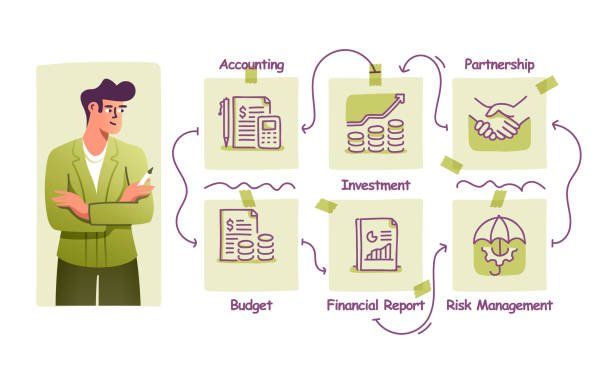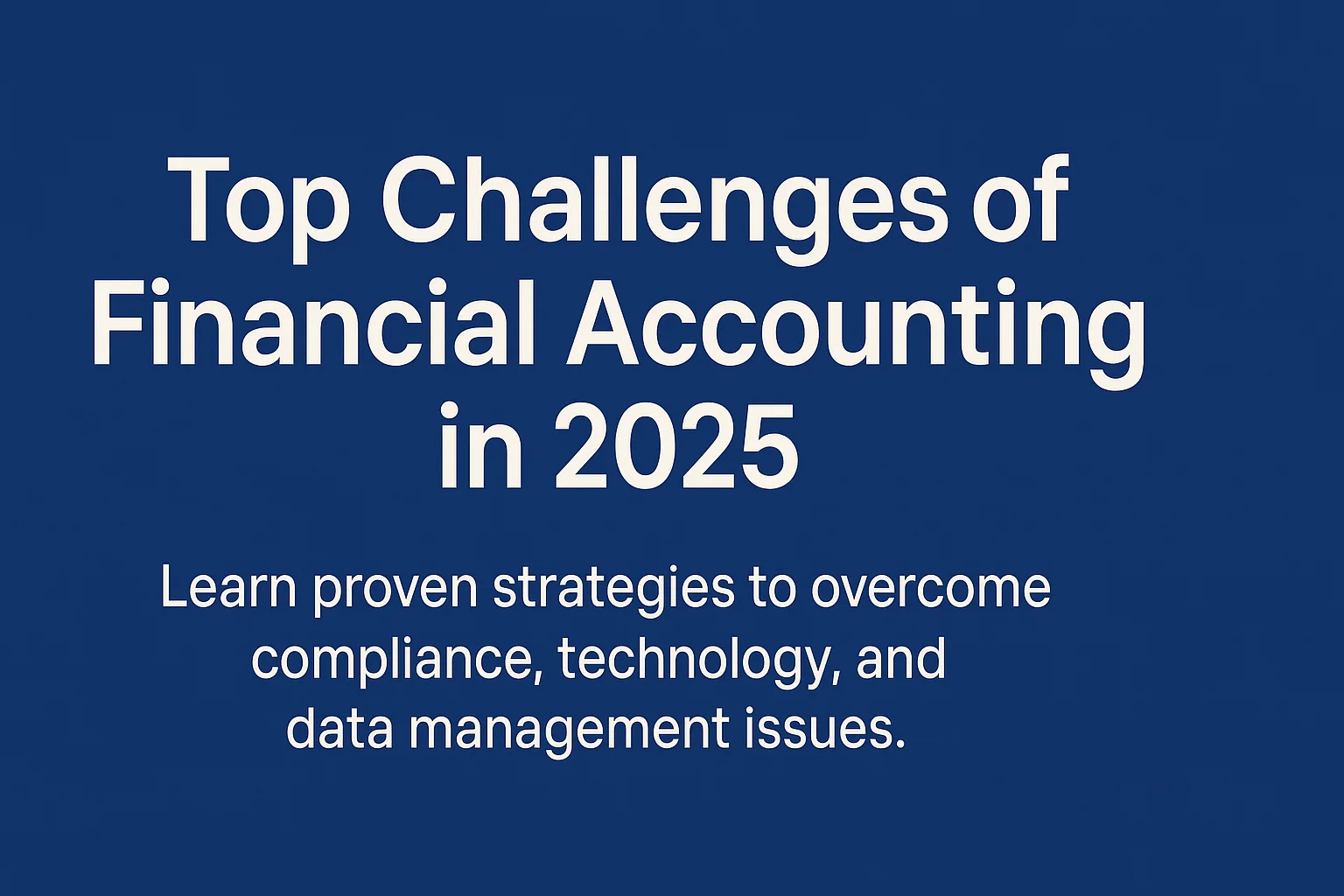The financial accounting landscape has become increasingly complex, with businesses facing unprecedented regulatory demands, technological disruptions, and skill shortages. From multinational corporations grappling with GDPR compliance to marketing agencies struggling with advertising cost allocation, the challenges of financial accounting affect organizations across all industries and sizes.
This comprehensive guide examines the most pressing Challenges of Financial Accounting professionals and business owners encounter today. You’ll discover industry-specific obstacles, learn from real-world case studies like the Enron scandal, and explore proven strategies to overcome these hurdles using advanced technology, enhanced training, and robust internal controls.
Whether you’re managing financial reporting for a healthcare organization, navigating revenue recognition in the technology sector, or implementing AI-driven accounting solutions, this guide provides actionable insights to help you address the most common accounting compliance issues and financial reporting problems facing businesses in 2025.
Understanding Financial Accounting in the Modern Business Environment

image by unsplash
Financial accounting encompasses the systematic recording, measuring, and communication of financial information to external stakeholders, including investors, creditors, regulators, and tax authorities. This discipline encompasses three core components: accurate financial reporting, regulatory compliance, and providing data to support strategic decision-making.
The role of financial accounting extends beyond simple bookkeeping. It serves as the foundation for investor confidence, regulatory adherence, and management decision-making. Companies rely on financial accounting to demonstrate transparency, meet legal obligations, and communicate their financial health to stakeholders.
However, the accounting profession faces mounting pressure from rapidly evolving regulations, increasing data volumes, and the need to adopt new technologies. These factors have created a perfect storm of challenges that require immediate attention and strategic solutions.
Significant Financial Accounting Challenges Facing Organizations

Image by iStockphoto
Regulatory Compliance Complexities
The regulatory landscape for financial accounting continues to evolve at an unprecedented pace. Organizations must navigate complex frameworks including Generally Accepted Accounting Principles (GAAP), International Financial Reporting Standards (IFRS), and industry-specific regulations.
Recent regulatory changes have introduced new requirements for revenue recognition, lease accounting, and financial instrument reporting. The transition from legacy standards to new frameworks often requires significant system upgrades, staff training, and process modifications. Companies operating in multiple jurisdictions face the additional challenge of reconciling different regulatory requirements while maintaining consistent reporting standards across all jurisdictions.
Staying current with regulatory changes requires dedicated resources and expertise. Many organizations struggle to accurately interpret new regulations, resulting in compliance gaps and potential penalties. The cost of non-compliance can be substantial, including financial penalties, reputational damage, and increased regulatory scrutiny.
Data Management and Accuracy Issues
Data integrity represents one of the most fundamental challenges in financial accounting. Organizations generate vast amounts of financial data from multiple sources, including enterprise resource planning (ERP) systems, customer relationship management (CRM) platforms, and third-party applications.
Ensuring data accuracy across these disparate systems requires robust data governance frameworks and consistent validation processes. Many companies struggle with data inconsistencies, duplicate entries, and integration challenges between legacy systems and modern applications.
The consequences of poor data management extend beyond simple reporting errors. Inaccurate financial data can lead to flawed business decisions, regulatory violations, and a loss of stakeholder trust. The Enron scandal serves as a stark reminder of how data manipulation and poor internal controls can lead to catastrophic business failure.
Technology Adoption and Integration Challenges
While technology offers significant opportunities to enhance accounting processes, many organizations face challenges in implementing and integrating these systems. Legacy accounting systems often lack the flexibility to incorporate modern technologies, such as artificial intelligence, blockchain, and cloud computing.
The adoption of new accounting technology requires substantial investment in software, hardware, and training. Many companies underestimate the complexity of system integration, leading to project delays, cost overruns, and user adoption issues.
Furthermore, the rapid pace of technological change necessitates that organizations continually evaluate and upgrade their systems to remain competitive. This creates ongoing pressure on IT budgets and requires accounting teams to develop new technical skills.
Skill Gaps and Workforce Challenges
The accounting profession faces a significant shortage of qualified professionals with the skills needed to address modern financial accounting challenges. Traditional accounting education often struggles to keep pace with technological advancements and evolving business needs.
Organizations require accounting professionals who can leverage advanced analytics, stay abreast of emerging technologies, and navigate complex regulatory environments. However, finding candidates with these combined skills proves increasingly challenging.
An aging workforce and declining enrollment in accounting programs compound the skills shortage. Many experienced accountants are approaching retirement, taking institutional knowledge with them. Meanwhile, younger professionals often lack the deep technical knowledge and practical experience needed to handle complex accounting challenges.
Industry-Specific Financial Accounting Challenges
Manufacturing Sector Challenges
Manufacturing companies face unique challenges in valuing inventory and allocating costs. The complexity of modern supply chains makes it difficult to accurately track costs and assign them to specific products or services.
Activity-based costing models require sophisticated systems and detailed data collection processes. Many manufacturers struggle to implement these models effectively, leading to inaccurate product costing and suboptimal business decisions.
Additionally, manufacturing companies must account for complex depreciation schedules, warranty obligations, and environmental liabilities. These requirements demand specialized knowledge and robust accounting systems.
Healthcare Industry Complications
Healthcare organizations operate in one of the most heavily regulated industries, facing complex revenue recognition requirements and stringent compliance obligations. The transition from volume-based to value-based care models has introduced new accounting challenges related to risk-sharing arrangements and quality-based payments.
Healthcare organizations must also navigate complex billing processes, insurance reimbursements, and charity care obligations. These factors create significant complexity in revenue recognition and cash flow management.
Regulatory compliance in healthcare extends beyond financial reporting to encompass privacy regulations, such as HIPAA, which govern how economic data can be collected, stored, and shared.
Technology Sector Revenue Recognition
Technology companies face particular challenges with software revenue recognition, especially for cloud-based services and subscription models. The implementation of ASC 606 (Revenue from Contracts with Customers) has significantly impacted how technology companies recognize revenue from complex arrangements.
Software companies must carefully evaluate contract terms, identify performance obligations, and determine the appropriate timing for revenue recognition. This process becomes particularly complex for multi-element arrangements involving software, services, and support.
Research and development expenses also present challenges for technology companies. Determining which costs should be capitalized versus expensed requires careful analysis and consistent application of accounting policies.
Accounting Challenges for the Marketing Industry
Marketing agencies and companies with significant advertising expenditures face unique challenges in accounting for marketing costs and customer acquisition expenses. The shift toward digital marketing has introduced new complexities in tracking and allocating marketing spend across multiple channels and campaigns.
Performance-based marketing arrangements create revenue recognition challenges, particularly when payment is contingent on achieving specific metrics or outcomes. Marketing companies must carefully evaluate contract terms and establish appropriate accounting policies for these arrangements.
Additionally, marketing agencies often employ retainer arrangements, project-based billing, and performance bonuses, which can create complexity in revenue recognition and project accounting.
Proven Strategies for Overcoming Financial Accounting Challenges
Investment in Advanced Technology Solutions
Organizations should prioritize investment in modern ERP systems that can integrate financial data from multiple sources and provide real-time reporting capabilities. These systems should include built-in compliance features and audit trails to support regulatory requirements.
Implementing AI-driven tools can significantly improve data accuracy and reduce manual processing time. Machine learning algorithms can identify anomalies, predict trends, and automate routine transactions, freeing accounting staff to focus on higher-value activities.
Cloud-based solutions offer scalability, accessibility, and cost-effectiveness compared to traditional on-premise systems. However, organizations must carefully evaluate security and compliance requirements when selecting cloud providers.
Comprehensive Staff Training and Development
Organizations should implement continuous training programs to keep accounting staff current with regulatory changes and technological advances. This includes formal training courses, professional certifications, and on-the-job learning opportunities.
Cross-training initiatives can help organizations build resilience and reduce dependence on individual staff members. By developing broad-based expertise across the accounting team, organizations can better handle staff turnover and workload fluctuations.
Partnerships with universities and professional organizations can provide access to emerging talent and cutting-edge research. These relationships enable organizations to stay ahead of industry trends and develop innovative solutions to address accounting challenges.
Robust Internal Control Systems
Strong internal controls are essential for preventing errors, detecting fraud, and ensuring compliance with regulatory requirements. Organizations should implement comprehensive control frameworks that include preventive, detective, and corrective controls.
Regular internal audits help identify control weaknesses and ensure that policies and procedures are being followed consistently. External audits provide additional assurance and can identify areas for improvement.
Technology can enhance internal controls by automating workflows, streamlining approval processes, and facilitating exception reporting. However, organizations must strike a balance between automation and appropriate human oversight and judgment.
Strategic Expert Consultation
Engaging with experienced accounting consultants can provide organizations with specialized expertise and objective perspectives on complex accounting issues. Consultants like PedroVazPaulo Business Consultant can help organizations navigate regulatory changes, implement new systems, and develop best practices.
Professional advisory services can be particularly valuable during periods of significant change, such as mergers and acquisitions, system implementations, or regulatory transitions. External experts can provide project management expertise and help organizations avoid common pitfalls.
Regular consultation with tax advisors, auditors, and legal counsel ensures that accounting policies and procedures align with current requirements and best practices.
Real-World Case Studies and Lessons Learned
The Enron Scandal: A Cautionary Tale
The collapse of Enron in 2001 remains one of the most significant accounting failures in corporate history. The company used complex financial structures and aggressive accounting practices to hide debt and inflate profits, ultimately leading to bankruptcy and criminal charges against key executives.
Poor data management and lack of transparency were central to Enron’s accounting failures. The company used special-purpose entities to move debt off its balance sheet and employed mark-to-market accounting in ways that obscured the true performance of its business operations.
The Enron scandal led to significant regulatory changes, including the passage of the Sarbanes-Oxley Act, which established new requirements for internal controls and corporate governance. This case demonstrates the critical importance of ethical accounting practices and robust internal controls.
GDPR Compliance Impact on Global Corporations
The implementation of the General Data Protection Regulation (GDPR) in 2018 created new challenges for multinational corporations operating in the European Union. These regulations impact financial accounting processes by restricting how personal data can be collected, processed, and stored.
Companies have had to implement new systems and processes to ensure compliance with GDPR requirements while maintaining effective financial reporting. This has required significant investment in technology, training, and compliance monitoring.
The global nature of many businesses means that GDPR compliance affects not just European operations but entire corporate accounting systems. Organizations have had to redesign processes to accommodate privacy requirements while maintaining operational efficiency.
Blockchain Implementation in Supply Chain Management
Several companies have successfully implemented blockchain technology to improve data accuracy and transparency in their supply chain accounting. Walmart, for example, uses blockchain to track food products from farm to store, providing unprecedented visibility into the supply chain.
This technology has enabled more accurate inventory tracking, reduced fraud, and improved compliance with food safety regulations. The immutable nature of blockchain records provides auditors with greater confidence in the accuracy of financial data.
However, blockchain implementation requires significant technical expertise and system integration capabilities. Organizations must carefully evaluate the costs and benefits of blockchain adoption for their specific use cases.
AI-Driven Financial Reporting Success Story
A mid-sized manufacturing company successfully implemented AI-powered accounting software to automate routine transactions and improve financial reporting accuracy. The system uses machine learning algorithms to categorize transactions, identify anomalies, and generate real-time financial reports.
The implementation resulted in a 40% reduction in manual data entry, improved accuracy rates, and faster month-end closing processes. The company was able to redeploy accounting staff to more strategic activities, including financial analysis and business partnering.
Key success factors included comprehensive staff training, careful system configuration, and ongoing monitoring of AI algorithms to ensure accuracy and reliability.
Frequently Asked Questions
What are the primary regulatory challenges in financial accounting?
The primary regulatory challenges include keeping pace with evolving standards, such as GAAP and IFRS, implementing new requirements like ASC 606 for revenue recognition, and managing compliance across multiple jurisdictions. Organizations must invest in training, systems, and processes to ensure ongoing compliance with these complex and changing requirements.
How can advanced accounting software help overcome financial accounting challenges?
Advanced accounting software can automate routine transactions, improve data accuracy, provide real-time reporting, and include built-in compliance features. Modern systems can integrate data from multiple sources, use AI for anomaly detection, and provide audit trails for regulatory compliance. Investing in the Best SaaS Accounting Software can significantly reduce manual work and improve accuracy.
Why is data governance important in financial accounting?
Data governance ensures accuracy, consistency, and accessibility of financial information across the organization. Poor data governance can lead to reporting errors, compliance violations, and flawed business decisions. Effective data governance includes establishing clear policies, implementing validation controls, and maintaining data quality standards.
What role does continuous monitoring play in financial accounting?
Continuous monitoring enables organizations to detect anomalies, ensure compliance, and identify potential issues before they escalate into significant problems. Real-time monitoring systems can alert accounting teams to unusual transactions, control failures, or compliance exceptions, enabling them to take prompt corrective action.
How can blockchain technology improve data accuracy in financial accounting?
Blockchain creates immutable and transparent records that can significantly enhance data accuracy and reduce fraud. In supply chain accounting, blockchain can provide end-to-end visibility and traceability. However, implementation requires significant technical expertise and system integration capabilities.
What are the key benefits of investing in staff training for financial accounting?
Staff training enables accounting professionals to stay current with regulatory changes, technological advancements, and best practices. Continuous learning enhances job performance, reduces errors, and allows organizations to adapt to evolving requirements. Training also improves employee satisfaction and retention.
How does GDPR compliance affect financial accounting processes for global corporations?
GDPR impacts how personal data within financial systems can be collected, processed, and stored. Organizations must implement privacy controls, data retention policies, and consent management processes while maintaining effective financial reporting. This often requires system modifications and the implementation of new compliance procedures.
Can AI and machine learning help in solving financial accounting challenges?
AI and machine learning can automate routine tasks, improve accuracy through anomaly detection, provide predictive insights, and reduce manual processing time. These technologies can help organizations handle increasing data volumes while enhancing the quality and compliance.
What is the impact of poor data management on financial accounting?
Poor data management can lead to inaccurate financial reports, compliance violations, audit findings, and flawed business decisions. The Enron scandal demonstrated how data manipulation and poor controls can lead to catastrophic business failure. Effective data management is essential for producing accurate and reliable financial reports.
How can businesses stay ahead of regulatory changes in financial accounting?
Organizations should establish monitoring processes for regulatory updates, participate in professional organizations, engage with external advisors, and invest in training programs. Maintaining relationships with auditors, consultants, and regulatory experts helps ensure awareness of emerging requirements.
What are the most common financial reporting issues, and how to address them?
Common issues include revenue recognition errors, inadequate internal controls, data quality problems, and compliance gaps. These can be addressed through improved systems, enhanced training, stronger controls, and regular monitoring. Professional consultation can help identify and resolve specific issues.
How do the challenges of financial accounting affect the marketing industry?
Marketing companies face unique challenges in performance-based billing, allocating customer acquisition costs, and tracking digital advertising expenses. These organizations must develop specialized accounting policies and systems to manage complex revenue arrangements and allocate marketing spend effectively.
What are the best practices for accounting compliance?
Best practices include establishing comprehensive policies and procedures, implementing robust internal controls, conducting regular training sessions, maintaining detailed documentation, and engaging external advisors. Organizations should also invest in appropriate technology and monitoring systems.
What emerging technologies are transforming financial accounting?
Key technologies include artificial intelligence for automation and analytics, blockchain for data integrity and transparency, cloud computing for scalability and accessibility, and robotic process automation for routine tasks. These technologies can significantly improve efficiency and accuracy.
How can a business consultant help in overcoming financial accounting challenges?
Business consultants bring specialized expertise, objective perspectives, and proven methodologies to address complex accounting challenges. They can help with system implementations, regulatory compliance, process improvements, and strategic planning. Consultants, such as those found through Success100x.com, can provide valuable guidance for organizations facing significant accounting challenges.
Building Resilience Through Strategic Financial Accounting Management
Successfully navigating the challenges of financial accounting requires a comprehensive approach that combines technology investment, staff development, robust controls, and strategic planning. Organizations that proactively address these challenges will be better positioned to maintain compliance, improve decision-making, and achieve sustainable growth.
The key to success lies in recognizing that financial accounting challenges are interconnected and require holistic solutions. Technology alone cannot solve complex accounting problems without proper implementation, training, and ongoing support. Similarly, even the most skilled accounting professionals need appropriate tools and systems to be effective.
As the business environment continues to evolve, organizations must remain agile and adaptable in their approach to financial accounting. This means staying current with regulatory changes, embracing new technologies, and continuously developing staff capabilities. By taking a proactive approach to addressing financial accounting challenges, organizations can transform potential obstacles into competitive advantages that drive long-term success.


